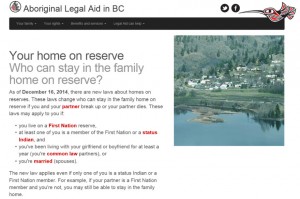7 Most Popular Clicklaw Resources of 2014
At Clicklaw, we use Google Analytics to track which pages are getting the most views, as well as where people are following through and clicking on links to resources and services on other websites.
There are of course other factors to consider in calculating resource helpfulness, but here is an interesting snapshot of the seven most viewed and clicked resource topics and links of the past year:
1) HelpMap: The Clicklaw HelpMap helps provide access to free low-cost legal advice and legal information services in BC.  You can look for services related to a particular topic in a particular city in BC using the search tool located on this page.
You can look for services related to a particular topic in a particular city in BC using the search tool located on this page.
Although people referred to fact sheets and written resources, it was clear that many were also seeking additional in-person help. Our most popular service pages referred to were for the Family Justice Centres and Court Registries in BC.


